|
|
|
IISD's
Summary Report is available online in HTML  TEXT
TEXT  PDF
PDF
|
|
|
Highlights
for Friday, 7 December 2001
|
|
|
|
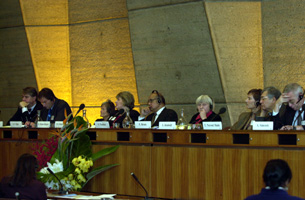
On Friday, the Global Conference on Oceans and Coasts presented its final
panel session in the morning, and heard reports from the Working Groups in
the afternoon on each of the eight thematic areas addressed throughout the
week, including recommendations for action. Following discussion on these
reports, the Conference heard closing remarks and adjourned at 5:45 pm.
|
|
|
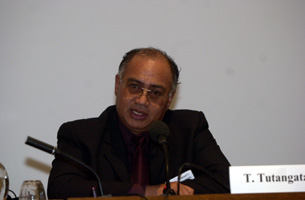
Tamari'i
Tutangata, Conference Organizing Committee, summarized the proceedings of
Thursday's panels. From the panel on the marine environment he
highlighted discussion of the health of oceans, local and international
waters assessments, and concern over anthropogenic change; on the capacity
building forum he noted topics including early efforts in data management,
and evolution of teaching and training programs and decision-making
support systems.
|
|
|
|
PANEL 17: IMPROVEMENTS IN
GLOBAL AND REGIONAL OCEAN GOVERNANCE
|
|
|
|
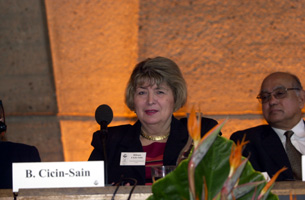
This panel addressed the need to improve ocean and coastal governance
through institutional strengthening, open and transparent decision-making
processes, access to scientific data, and cooperation at regional and
global levels. Conference Co-Chair Biliana Cecin-Sain (left) reminded
participants of the themes of the panel and introduced the speakers.
|
|
|
|
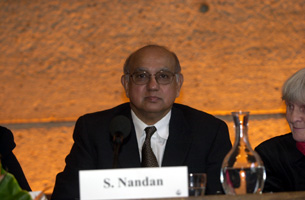
Satya Nandan, International Seabed Authority, presented a background to
the current legal framework of UNCLOS and associated agreements and
declarations for ocean governance.
|
|
|
|
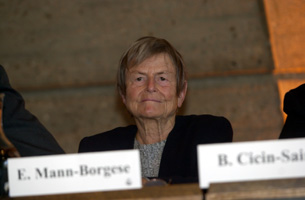
Elisabeth
Mann Borgese, International Ocean Institute, underlined the importance of
peace and security for ocean governance, and the political and strategic
context in which it is formed. She expressed optimism at the trend toward
decentralization and local community empowerment, and for a new
relationship between the public and private sectors.
|
|
|
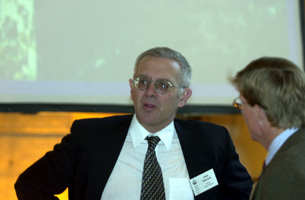 Alan
Simcock, Convention for the Protection of the Marine Environment of the
North-East Atlantic, provided a detailed review of the
United Nations Open-ended Informal Consultative Process on Ocean Affairs (UNICPO),
also known as the UN Oceans Process. He traced its history, noting its
creation by GA Resolution 64/33 in response to the need for inter-agency
coordination, and noted that this process: brings together legal,
economic, social, environmental and political spectra; promotes coherence
among global and regional organizations; and helps states to synthesize
elements and develop unified national formats addressing the marine
environment. Alan
Simcock, Convention for the Protection of the Marine Environment of the
North-East Atlantic, provided a detailed review of the
United Nations Open-ended Informal Consultative Process on Ocean Affairs (UNICPO),
also known as the UN Oceans Process. He traced its history, noting its
creation by GA Resolution 64/33 in response to the need for inter-agency
coordination, and noted that this process: brings together legal,
economic, social, environmental and political spectra; promotes coherence
among global and regional organizations; and helps states to synthesize
elements and develop unified national formats addressing the marine
environment.
|
|
|
|
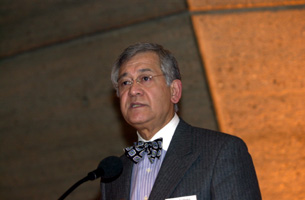
Tuiloma Neroni Slade, AOSIS, elaborated further on the Oceans Process,
focusing on achievements in two consultative sessions since its creation:
one with a focus on fisheries and another addressing marine science and
cooperation to ensure a sectoral research approach.
|
|
|
|
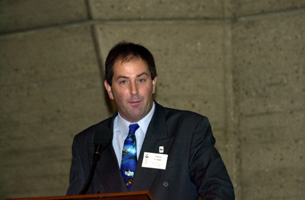 Simon
Cripps, WWF, presented an NGO perspective on global and regional ocean
governance. He stated that the greatest problem is lack of political will,
and said people must be inspired by the oceans movement. He listed ten
proposals for concrete action that would constitute a "sea change" in
ocean governance, including reduction of harmful fishing subsidies by the
EU, implementation of policies to protect sea turtles and establishment of
MPAs on the high seas. Simon
Cripps, WWF, presented an NGO perspective on global and regional ocean
governance. He stated that the greatest problem is lack of political will,
and said people must be inspired by the oceans movement. He listed ten
proposals for concrete action that would constitute a "sea change" in
ocean governance, including reduction of harmful fishing subsidies by the
EU, implementation of policies to protect sea turtles and establishment of
MPAs on the high seas.
|
|
|
|
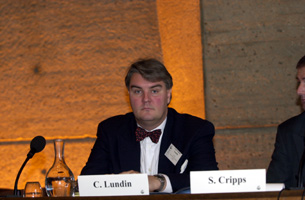

Carl
Lundin, Marine Programme, IUCN, addressed private-NGO-government
partnerships in governance, describing several projects for joint resource
management that show preliminary success. He underlined the need to
further address tenure rights, and noted the potential of individual
transferable quotas (ITQs).
|
|
|
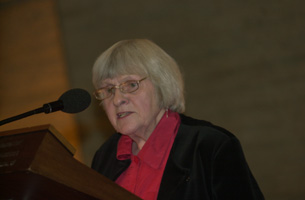
Patricia Birnie, London School for Economics and Political
Science,
UK,
discussed the unique harmonization and development of fisheries policies
underway in the EC. She explored the creation and limits of partnerships
through examples of cooperation and conflict, raising the issue of how far
collaboration could go towards implementing conventions and questioning
how effective stakeholder involvement could be if stakeholders could not
agree.
|
|
|
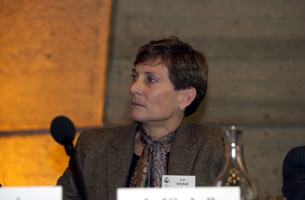
Lee Kimball, Consultant, USA, elaborated on comparative advantages of
regional bodies in approaches to ocean governance and new imperatives of
integrated approaches to Agenda 21. She proposed concentrating on higher
regional assessments to: define geographic dimensions; develop shared
visions; sort out roles and design of coherent programmes; strengthen
expert networks and expand capacity and understand how to better use
existing tools to strengthen regional platforms and implement conventions.
|
|
|
|
ROUNDTABLE REPORTS FROM
THE WORKING GROUPS:
|
|
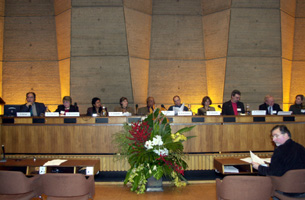
On Friday afternoon, a panel of participants representing
each Working Group (WG) reported the outcomes of their discussions held
throughout the week, briefly highlighting key points and emerging issues
and offering recommendations for action.
|
|
|
|
CONFERENCE CONCLUSION:
|
|
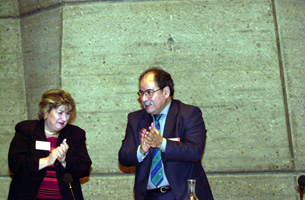  Listen
to Patricio Bernal's closing statement.
Listen
to Patricio Bernal's closing statement.
Chair Bernal read the Co-Chair's Draft Concluding Statement, to be
included in the Conference's outputs.

Chair
Cicin-Sain thanked all participants for their active involvement, funding
institutions for providing support, ministers for their attendance, the
Working Groups for their reports, the panels for their efficient focus,
the IOC and CMP secretariats and others,
and Co-Chair Bernal for his courage in assembling such a hybrid mix of
experts in one forum.
|
|
|
|
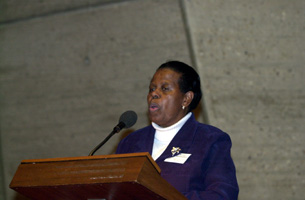  Listen
to Rejoice Mabudafhasi's closing statements.
Listen
to Rejoice Mabudafhasi's closing statements.
Deputy Minister Rejoice T. Mabudafhasi, Department of Environmental
Affairs and Tourism, South Africa, thanked all for their presence and for
the role they each play on the road to Johannesburg and in sustainable
development, noting that this work would affect not just the WSSD but the
lives of many people. She described the challenging legacy of UNCED;
recounted emerging themes and issues to be addressed; and said the WSSD
must achieve implementation to combat poverty, impact trade, finance
investment and emerge with a "Johannesburg Programme of Action."
|
|
|
|



 Alan
Simcock, Convention for the Protection of the Marine Environment of the
North-East Atlantic, provided a detailed review of the
United Nations Open-ended Informal Consultative Process on Ocean Affairs (UNICPO),
also known as the UN Oceans Process. He traced its history, noting its
creation by GA Resolution 64/33 in response to the need for inter-agency
coordination, and noted that this process: brings together legal,
economic, social, environmental and political spectra; promotes coherence
among global and regional organizations; and helps states to synthesize
elements and develop unified national formats addressing the marine
environment.
Alan
Simcock, Convention for the Protection of the Marine Environment of the
North-East Atlantic, provided a detailed review of the
United Nations Open-ended Informal Consultative Process on Ocean Affairs (UNICPO),
also known as the UN Oceans Process. He traced its history, noting its
creation by GA Resolution 64/33 in response to the need for inter-agency
coordination, and noted that this process: brings together legal,
economic, social, environmental and political spectra; promotes coherence
among global and regional organizations; and helps states to synthesize
elements and develop unified national formats addressing the marine
environment. 

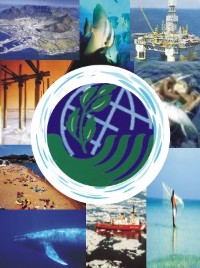





 Simon
Cripps, WWF, presented an NGO perspective on global and regional ocean
governance. He stated that the greatest problem is lack of political will,
and said people must be inspired by the oceans movement. He listed ten
proposals for concrete action that would constitute a "sea change" in
ocean governance, including reduction of harmful fishing subsidies by the
EU, implementation of policies to protect sea turtles and establishment of
MPAs on the high seas.
Simon
Cripps, WWF, presented an NGO perspective on global and regional ocean
governance. He stated that the greatest problem is lack of political will,
and said people must be inspired by the oceans movement. He listed ten
proposals for concrete action that would constitute a "sea change" in
ocean governance, including reduction of harmful fishing subsidies by the
EU, implementation of policies to protect sea turtles and establishment of
MPAs on the high seas.


